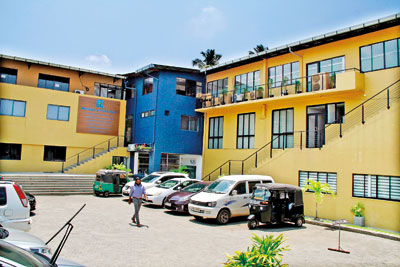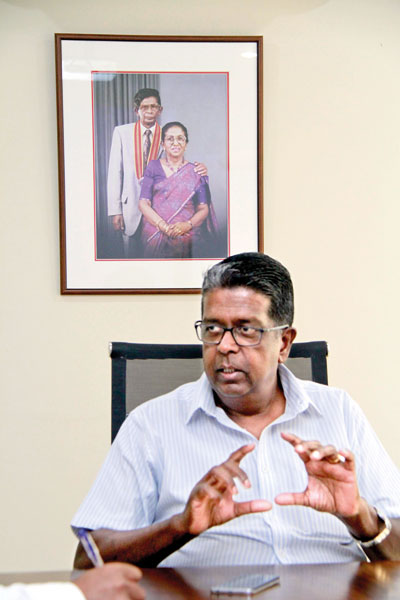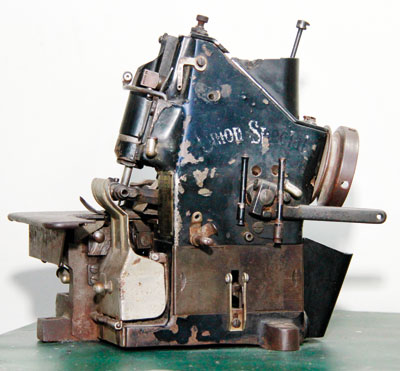A marriage made in heaven behind Bernard Botejue’s success
It wasn’t quite Romeo and Juliet. Bernard Botejue borrowed a friend’s motorcycle and went to visit Hema one day in 1955. He was one her many suitors and 17 years her elder. Inexplicably, she agreed to marry him, and thus became the driving force behind Bernard Botejue Industries which on April 1 celebrates its 70th anniversary.

Bernard Botejue's office complex at Kohuwela. Pix by Indika Handuwala
“I never asked my mum why she decided to marry my father,” smiles Janaka Botejue, managing director of the company which lays claim to being the oldest garment manufacturer in Sri Lanka still around. “But it was an arranged marriage and he was one of the last persons to come and see her”.
Hema had turned down every other suitor. But when she saw Bernard riding up the driveway of her home in Galle, something clicked. She decided this man was to be her husband. And so, began a long and fruitful relationship which created one of the most well-known brand names in Sri Lanka. Anyone from the older generation remembers those cotton ‘banians’ and famous Bernard’s T-shirts.
“They say marriages are made in heaven,” shrugs Janaka as I try to pin down why the chemistry flowed between his parents. “But what I know definitely is that while my dad was the visionary and entrepreneur, it was my mum who was the driving force.”
Until Hema turned up on the scene, Bernard had been struggling to find his feet in a business which he had fallen into almost by accident. Having studied at St. Thomas’ College and completed a degree at Colombo University, Bernard began his working career as a part-time library assistant at the Ceylon Medical College which was to play a part in his business later.
The humdrum life of a library assistant wasn’t exactly to Bernard’s liking and soon after, he took up a posting as a supervisor at the Ceylon Hosiery Company. His creative juices were beginning to flow and when independence came to Ceylon in 1948, he too decided and it was best to be your own person than work for others, so he began a small operation manufacturing vests.
Remember the Medical College? Well, he borrowed money from some doctors he knew well, including Dr. P.R. Anthonis, to raise capital and buy one knitting machine and two sewing machines.
“My dad used to knit the fabric then bleach the fabric before giving it to three girls he had hired to do the stitching. He then took the finished product, and when he had a sizeable stock, got into a van and went around the country selling the vests. Then with the money he made, he would again buy fabric and the whole process would start all over again,” related Janaka.

Janaka Botejue reflects on the past, present and the future, with a picture of his founder-parents above
Small workforce
It was a haphazard operation to begin with. At the beginning, when he was on the road, even going as far as Jaffna, the factory at Kohuwala was closed – for Bernard was the only person who knew how to operate the knitting machine. But all that changed soon. Within a year, his small workforce had grown 10 times and the ‘tagarrang’ sheds were a hive of activity.
And then seven years later, in 1955, Hema arrived on the scene and things began to look even sunnier. She had an impact even before marriage – the ancestral two-acre coconut land at Kohuwela being bequeathed to Bernard.
“My dad was single-minded and strong. He told his parents he would only get married if he got the land. They complied and my dad had the base for his operations. When he got married my mum’s business acumen and his vision were the perfect combination,” summed up Janaka.
Janaka’s son, Bernard, and daughter Gayani – both key figures in the company today – are also listening raptly as their dad goes down memory lane relating how their grandparents created a dream which today benefits hundreds of people in Colombo, and Kolonna, Embilipitiya.
By 1967, the business had transformed into Bernard Botejue Industries Ltd, and was given further impetus when Hema won a scholarship from The Colombo Plan for a six-month training programme in industrial development in Germany. Husband and wife left for West Germany which was itself transforming into an economic power. The days of just making ‘banians’ were over. With machines they brought down, the Botejues were looking at manufacturing everything from knitted garments to ladies’ blouses and men’s Polo shirts and underwear and socks.
“It was a golden era for us,” recounts Janaka. Although still a schoolboy at St. Thomas’ he remembers the closed economy of the Sirimavo era meant whatever the company made was quickly snapped up locally as there was a huge demand for garments with the outside world all but closed out.
Janaka, as enterprising as his dad and selling newspapers and bottles to augment his school days’ income – “My dad gave me 100 rupees pocket money just to see that I made sure all the windows around his factory were closed and that was quite a big sum those days” – joined the company in 1980, a few years after the green revolution swept J.R. Jayewardene into power.
It was heady days. The company had started joint ventures with overseas partners based in Hong Kong, Sweden and the US. But storm clouds were rolling in. The 1983 riots heralded hard times were ahead for the country. Yet, the company expanded bravely.
Embilipitiya
In 1992 it became a BOI company and under President Premadasa’s 200 garment factory plan – to have one factory in each electorate – Bernard Botejue Industries opened in remote Kolonna, Embilipitiya.
“We were originally given Kurunegala and then we thought we would move to Galle or Matara. But a relative of ours advised us to go to Embilipitiya, far from the beaten track where there is no tourism or any other attractions,” Janaka revealed.
It was sound advice for the people of the area had no other distractions and came to work. The factory in Colombo by then had a workforce of 1,500 – workers lived in a hostel on the premises with the Botejues providing food too – but signs were starting to show that the operation was becoming a bit unwieldly.
There was heartache in 1998, Bernard passed away at the age of 84. This led to introspection within the family and two years later, in 2000, an amicable split occurred between Janaka and his elder brother Ravi who took control of Texfabric and Bernards Philknit as Bernard Botejue Industries divested.
The Colombo factory was also downsized due to labour shortages in 2003 with Kolonna and a new plant in Hambantota taking up the slack. But the business cliemate continued to remain bleak, not helped by the full-blown war. External forces also made matters worse with the European economic crisis affecting the garment industry badly.

An old machine once used by the company
“It was tough and things got harder in 2009 when one of our main customers in the UK went bust and left us with huge debts,” Janaka narrated.
His children, Bernard (jnr.) and Gayani, were now ready to follow in his footsteps both having completed degrees in UK, Liverpool and Durham, and joining in 2008 and 2010 respectively. “Both of them brought in new management techniques and new younger generation thinking into the company,” says a proud father.
Bernard Jnr, 32, takes up the story: “We have restructured the company in a way that Bernard Botejue Industries (BBI) will become the holding company and all other subsidiaries will be owned by it, and the family will own the holding company. The company will be run by professionals and next generation family members will only be shareholders. It is vital we do this because most Sri Lankan family-run companies don’t tend to be successful after a few generations.”
The long-haired Bernard (didn’t the song go ‘long-haired lover from Liverpool’?) graduated in business and music. It was just natural that he follows his heart and apart from handling the company’s Sentrino arm which deals in the corporate promotional T-shirt industry and the apparel embellishment industry, he is also the force behind an entertainment arm with the focus on rehearsal spaces for musicians and bands as well as equipment hiring.
Gayani, 29, also holds a degree in business administration. Her love is the travel industry and she is in charge of BBI’s burgeoning hospitality division Everton Holidays.
Travel agency
“We have a travel agency – My Lankan Dream – where we specialise in tailormade and very personalised luxury holidays for the high-end market,” Gayani says. “We also manage holiday bungalows and villas.”
The diversification also includes Bernards Business Park – the old ancestral home which is centrally located and offering 75,000 square feet of office space which has now become a business hub – housing more than 20 outside companies – as well as Cargills Food City. BBI is also headquartered in these premises.
All the diversification would not have been possible without Brandix offering a helping hand when times were tough.
“We had bad fortune but we turned it around. We downsized hugely from 2008 to 2010. A lot of people told me to get out and pay my debts. But this was a company started by my dad and I wanted to continue it,” reveals Janaka.
“I decided to tighten the belt, and buckle down. We sold unproductive assets including tea estates. We sold many vehicles among other things. It took us six-years to pay back our creditors. We were in debt to the tune of US$2 million,” he adds.
Bernard Jnr. believes it is a lesson well-learned: “This financial downside is definitely not an embarrassment. If we had a time machine to go back we would still make those decisions, for it is because we went into financial difficulties that our foundations today is solid, and we have to thank Brandix a great deal for helping us out.”
Bernard Botejue Industries struck a “strategic relationship” with Brandix where they became a virtual supplier to one of Brandix’s main customers. It worked for both parties, mainly giving BBI a massive lifeline.
Today, as it celebrates its 70th birthday, the company which Bernard created in 1948 is making a massive impact on the lives of many people. Hema, who passed away two years ago, and Bernard is sure to look down today and smile contentedly at their life’s work.


